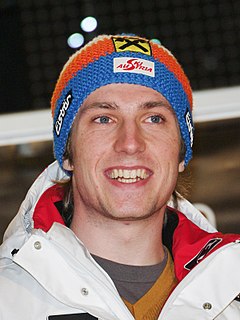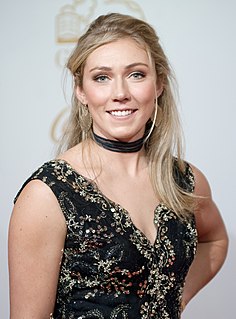
Slalom is an alpine skiing and alpine snowboarding discipline, involving skiing between poles or gates. These are spaced more closely than those in giant slalom, super giant slalom and downhill, necessitating quicker and shorter turns. Internationally, the sport is contested at the FIS Alpine World Ski Championships, and at the Olympic Winter Games.

Skiing can be a means of transport, a recreational activity or a competitive winter sport in which the participant uses skis to glide on snow. Many types of competitive skiing events are recognized by the International Olympic Committee (IOC), and the International Ski Federation (FIS).

The FIS Alpine Ski World Cup is the top international circuit of alpine skiing competitions, launched in 1966 by a group of ski racing friends and experts which included French journalist Serge Lang and the alpine ski team directors from France and the USA. It was soon backed by International Ski Federation president Marc Hodler during the FIS Alpine World Ski Championships 1966 at Portillo, Chile, and became an official FIS event in the spring of 1967 after the FIS Congress at Beirut, Lebanon. The first World Cup ski race was held in Berchtesgaden, West Germany, on January 5, 1967. Jean-Claude Killy of France and Nancy Greene of Canada were the overall winners for the first two seasons.

Giant slalom (GS) is an alpine skiing and alpine snowboarding discipline. It involves skiing between sets of poles (gates) spaced at a greater distance from each other than in slalom but less than in Super-G.

Canoe slalom is a competitive sport with the aim to navigate a decked canoe or kayak through a course of hanging downstream or upstream gates on river rapids in the fastest time possible. It is one of the two kayak and canoeing disciplines at the Summer Olympics, and is referred to by the International Olympic Committee (IOC) as Canoe/Kayak Slalom. The other Olympic canoeing discipline is canoe sprint. Wildwater canoeing is a non-Olympic paddlesport.

Jan Ingemar Stenmark is a former World Cup alpine ski racer from Sweden. He is regarded as one of the most prominent Swedish athletes ever, and as the greatest slalom and giant slalom specialist of all time. He competed for Fjällvinden Tärnaby.

Alberto Tomba is a former World Cup alpine ski racer from Italy. He was the dominant technical skier in the late 1980s and 1990s. At 6 ft tall and 90 kg, his powerful build was a contrast to the lighter, more traditional technical skiers who prioritised agility over muscle. Tomba was able to take advantage of the introduction of spring-loaded ski gates which replaced the older, solid gates in the early 1980s by using his power to maintain a faster, more direct line through courses. Tomba won three Olympic gold medals, two World Championships, and nine World Cup season titles: four in slalom, four in giant slalom, and one overall title. He was popularly called Tomba la Bomba.

Tina Maze is a retired Slovenian World Cup alpine ski racer.

Alpine skiing has been contested at every Winter Olympics since 1936, when a combined event was held in Garmisch-Partenkirchen, Germany.
Combined is an event in alpine ski racing. A traditional combined competition consists of one run of downhill and two runs of slalom, each discipline run on separate days. The winner is the skier with the fastest aggregate time. A modified version, the super combined, is a speed race and only one run of slalom, with both portions scheduled on the same day.

Maria Francis (Lund) is a British and Welsh slalom canoeist who competed in the 1980s and 1990s. She was women's K1 British Champion in 1989, silver medalist at the 1990 Europa Cup in Merano and went on to win a bronze medal in the K1 team event at the 1993 ICF Canoe Slalom World Championships in Mezzana.

Marcel Hirscher is an Austrian World Cup alpine ski racer. Hirscher made his World Cup debut in March 2007. He competes primarily in slalom and giant slalom, as well as combined and occasionally in super G. Winner of a record eight consecutive World Cup titles, Hirscher has also won 11 medals at the Alpine Skiing World Championships, seven of them gold, a silver medal in slalom at the 2014 Winter Olympics, and two gold medals in the combined and giant slalom at the 2018 Winter Olympics. Due to his record number of overall titles, many years of extreme dominance of both slalom and giant slalom and of the men's overall ranking, he is considered by many, including his rivals Henrik Kristoffersen, Kjetil Jansrud and Alexis Pinturault, to be the best alpine skier in history.
The ICF Canoe Slalom World Cup is an annual series of races in canoe slalom held under the auspices of the International Canoe Federation. It has been held since 1988 in four canoe and kayak disciplines for men and women. The four original disciplines were men's single canoe (C1), men's double canoe (C2), men's kayak (K1) and women's kayak. A women's single canoe discipline (C1) has been added to the world cup in 2010. The men's C2 event was removed from the world cup series in 2018 and it was replaced by the mixed C2 event. 2018 was also the first time that world cup points were awarded for the extreme K1 event.

The 46th World Cup season began on 22 October 2011, in Sölden, Austria, and concluded on 18 March 2012, at the World Cup finals in Schladming, Austria.

Mikaela Pauline Shiffrin is an American two-time Olympic gold medalist and World Cup alpine skier. She is the current three-time reigning Overall World Cup champion, the four-time reigning world champion in slalom, and a six-time winner of the World Cup discipline title in that event. Shiffrin is the youngest slalom champion in Olympic alpine skiing history, at 18 years and 345 days.

The 48th World Cup season began on 26 October 2013, in Sölden, Austria, and concluded on 16 March 2014 at the World Cup finals in Lenzerheide, Switzerland. The defending overall champions from the 2013 season were Marcel Hirscher of Austria and Tina Maze of Slovenia. The overall titles were won by Hirscher and Anna Fenninger, also of Austria. The season was interrupted by the 2014 Winter Olympics that took place from 7 to 23 February in Sochi, Russia, with the alpine events at Rosa Khutor.

The 49th World Cup season began on 25 October 2014, in Sölden, Austria, and concluded on 22 March 2015 at the World Cup finals in Meribel, France. The defending overall champions from the 2014 season - Marcel Hirscher and Anna Fenninger, both of Austria, defended their titles successfully. The season was interrupted by the World Championships in February, in the United States at Vail/Beaver Creek, Colorado. Combined events were not awarded as a discipline trophy.
The International Ski Federation (FIS) Alpine World Cup tour is the premier circuit for alpine skiing competition. The inaugural season launched in January 1967, and the 2016 season marked the 50th consecutive year for the FIS. This World Cup season began on 24 October 2015, in Sölden, Austria, and concluded in Saint Moritz, Switzerland on 20 March 2016. The World Ski Championship, a biennial event, did not interrupt this competitive season, and the upcoming World Championships were held Saint Moritz, Switzerland in February 2017

The International Ski Federation (FIS) Alpine Skiing World Cup is the premier circuit for alpine skiing competition. The inaugural FIS World Cup season launched 52 years ago in January 1967 and this 51st season began on 22 October 2016 in Sölden, Austria, and concluded in the United States at Aspen on 19 March 2017. The biennial World Championships interrupted the tour in early February in Saint Moritz, Switzerland. The season-ending finals in March were held in North America for the first time in two decades: the last finale in the U.S. was in 1997 at Vail.














